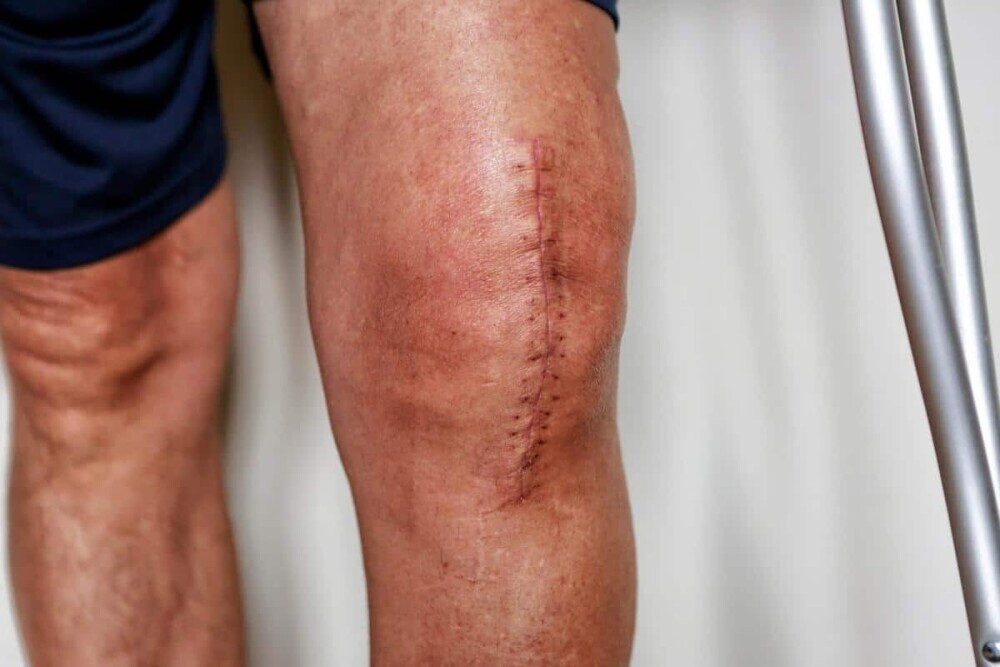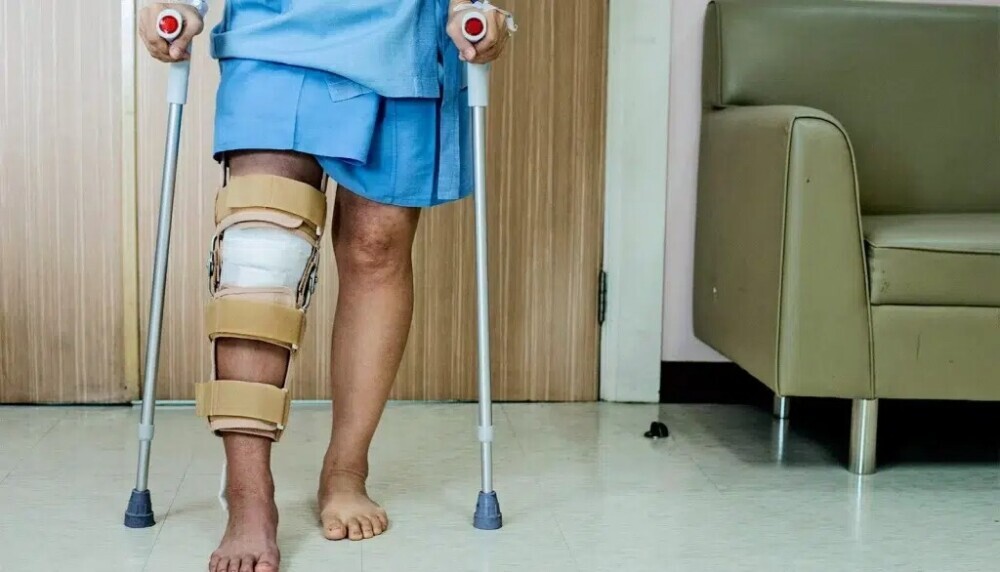
Knee replacement surgery, often a last resort when pain becomes unbearable, involves replacing damaged knee parts with artificial ones. It’s a big leap but often leads to a significant quality of life improvement.
The timeline for recovery varies widely among individuals. Initially, you’ll likely experience pain and might need help with everyday tasks. While there’s no universal recovery timeline, many people find they can resume activities like walking or gentle exercises within a few weeks.
Individual factors significantly affect recovery times. Your fitness level before surgery, age, and overall health condition all play vital roles. Younger individuals or those who maintain an active lifestyle tend to rebound more quickly.
Understanding your personal recovery journey involves communication with your healthcare team. They provide guidance, set realistic expectations, and monitor your progress, helping to ensure a smoother path back to mobility.
Factors Influencing Recovery Time
Your level of activity before heading into surgery plays a significant role in how you bounce back. People who keep active often find they regain movement more quickly. Staying fit can be like practicing for this big event—your body tends to respond better if it’s used to regular movement.
Age isn’t just a number when it comes to recovery. Generally, younger folks may see a quicker recovery timeline, but older adults with a disciplined rehab regimen can achieve fantastic results too.
The presence of other health conditions can also slow down or complicate healing. Issues like diabetes or heart conditions demand more attention during recovery. They might not be showstoppers, but they’ll require you to have more check-ins with your health professional.
Total knee replacements usually demand more time for recovery compared to partial replacements. With partial procedures, the trauma to your body is less extensive, which often leads to a faster comeback.
Talk to your surgeon and physiotherapist to understand what your specific recovery might look like. Tailor your post-procedure care to fit your body’s needs and adjust your expectations accordingly.
Effective Recovery Techniques and Tips

Embracing a few simple yet effective recovery techniques can make a massive difference in how quickly and comfortably you get back on your feet.
First off, let’s chat about incision care. Keep it clean and follow your surgeon’s guidelines to avoid complications. Think of it as nurturing a new plant – gently, regularly, and with care.
Managing pain is crucial. Your healthcare team will likely suggest a medley of pain relief options, including prescription meds, NSAIDs, and good old acetaminophen. If the pain is yelling louder than it should, reach out to your doctor.
At home, icing your knee for 20 minutes several times daily helps keep swelling in check. It’s like blowing cool air on engine trouble; it offers relief and prevents overheating.
Elevate your knee above heart level whenever you’re kicked back. This helps reduce swelling. Picture gravity as your buddy coaxing that pesky fluid away from your knee.
Get moving with home exercises as soon as it’s safe. These don’t have to be Olympic-level feats – your physiotherapist will provide simple exercises to get your knee and muscles back in shape.
Physical therapy is a rockstar here, too. Working with a therapist helps boost mobility and confidence. They’ll guide you through exercises tailored to your recovery stage and goals. Regular sessions can be life-changing, paving the road to a swifter and more comfortable return to normal activities.
Managing Pain and Returning to Routine
Experiencing pain after knee surgery? Totally normal! It might be intense for the first few weeks, but that’s just part of healing. Your doctor will likely recommend a mix of prescription meds, NSAIDs, or the trusty acetaminophen. Stick to their advice to keep discomfort at bay. If it’s too much, though, don’t just tough it out—let your healthcare team know so they can adjust your treatment plan.
As for diving back into the daily grind, give yourself a break for a few weeks. The time you take off work or school really depends on what you do all day. Desk job? You might be ready sooner than someone whose job demands heavy lifting or lots of standing.
Getting help at home in the early days is more than okay—it’s smart! Bathing, cooking, shopping—it’s a team effort at first. Think of setting up safety measures around the house, like grab bars and shower benches, as leveling up your home base. These changes help not just with comfort but ensuring you recover right.
In time, the routine stuff comes back naturally. Walking becomes less of a bother, and the confidence grows. Just remember, pushing too hard, too soon can set you back. Stick with your recovery plan and ease back at a pace that feels right to you.
Recognizing Complications and the Road to Full Recovery

While most folks journey through recovery without major hiccups, being on the lookout for serious signs is crucial. If you ever feel chest pain, shortness of breath, or notice fever and excessive bleeding, ring your doctor immediately. It could be a sign of something needing quick attention.
Your full recovery outlook is bright but requires patience. It’s a marathon, not a sprint. The objective is to achieve less pain and more mobility, allowing you to enjoy daily life much more fully. Setbacks can happen, but they’re part of the process.
Nutrition is your best ally during recovery. A diet loaded with fruits, veggies, lean proteins, and whole grains fuels the healing process. Consult with your healthcare provider for personalized nutrition advice that fits right into your recovery plan.
Adjustments to your lifestyle might be in order to safeguard your knee’s health in the long haul. Avoid crossing your legs, heavy lifting, and kneeling on your new knee until it’s safe to do so. Keep those sneakers ready to keep moving gently.
Recovery isn’t just about getting back to where you were before—the goal is to surpass that mark, feeling not just normal, but better than you have in years. With the right focus and care, knee replacement surgery can open up a whole new chapter of active living.
** Our website contains affiliate links. This means if you click and make a purchase, we may receive a small commission. Don’t worry, there’s no extra cost to you. It’s a simple way you can support our mission to bring you quality content.
FAQ
How long does knee replacement surgery take to recover?
Full recovery from knee replacement surgery typically takes several months to a year. Most people can resume daily activities after about 6 weeks, but regaining full strength and mobility may take up to 12 months.
How long does it take to walk normally after total knee replacement?
Many patients start walking with assistance (crutches or walker) within a few days after surgery. You can typically walk unassisted after about 6 weeks, though some people may take longer depending on individual recovery rates and rehabilitation efforts.
What are the hardest days after total knee replacement?
The first few days after surgery are usually the hardest, as this is when pain and swelling are most intense. This period typically lasts about 2 weeks, with discomfort gradually decreasing as you heal.
How painful is a total knee replacement?
Total knee replacement is considered a painful procedure, especially in the first few weeks post-surgery. However, pain is managed with medications, and it typically improves as the body heals over the first few months. Most patients experience significant relief from chronic pain once recovery progresses.
How long is bed rest after knee replacement?
Strict bed rest is not recommended after knee replacement surgery. You will be encouraged to start moving and walking with assistance within a day or two. Prolonged bed rest can increase the risk of complications like blood clots, so early mobility is a key part of recovery.
How many hours is a total knee replacement?
A total knee replacement surgery typically takes 1 to 2 hours to complete, depending on the complexity of the procedure and the individual patient’s condition.

Hi John,
Great insights on knee replacement recovery! It’s fascinating how individual factors like fitness level, age, and overall health play such significant roles in the healing process.
I especially liked the emphasis on staying active before surgery to aid recovery. Given how varied the timelines can be, what would you say is the most important factor patients should focus on post-surgery to ensure a smoother, faster recovery—whether it’s physical therapy, pain management, or something else?
Hi Daniella,
Thank you so much for your thoughtful comment! I’m glad you found the insights on knee replacement recovery helpful. You’re absolutely right—factors like fitness level, age, and overall health can really shape the recovery experience.
As for the most important factor post-surgery, I’d say that physical therapy is crucial for a smoother and faster recovery. It helps restore strength, mobility, and flexibility in the joint, which is essential for regaining independence. That said, pain management is equally important, as it enables patients to participate fully in physical therapy without being limited by discomfort.
Staying consistent with prescribed exercises, managing swelling, and maintaining a positive mindset all play a role in speeding up recovery. Ultimately, it’s about a balance of these elements, but focusing on movement and guided exercises is often the key to long-term success!
Cheers
John
This article provides a thorough and informative look into knee replacement recovery time, which can often be an area filled with uncertainty for patients. I appreciate the detailed breakdown of factors influencing recovery, especially the emphasis on individual variables like age, fitness level, and overall health.
One question I have is about the role of mental health and emotional support during the recovery journey. Since recovery from major surgeries can be challenging, do you recommend any specific strategies for staying positive or mentally resilient? Also, how can caregivers or family members best support someone through the initial weeks of recovery?
Thank you for including tips on managing pain and understanding potential complications—it’s very reassuring for those who may be apprehensive about the recovery process. Looking forward to any insights on mental and emotional aspects of recovery!
Hi Amalthe,
Thank you for your thoughtful comment! I’m glad the article helped clarify what to expect with knee replacement recovery. You’re absolutely right—mental and emotional resilience can make a big difference during the healing process.
Here are a few strategies for maintaining a positive mindset and staying resilient:
1. Set Small Goals – Breaking down recovery into manageable steps, like improving range of motion or walking a bit further each day, can provide a sense of accomplishment. Celebrating these small wins helps keep morale high.
2. Mindfulness and Relaxation Techniques – Practices like meditation, deep breathing, or even light journaling can reduce stress and create a sense of calm. Many people find that spending even a few minutes a day on mindfulness can help them stay centered and focused on their progress.
3. Stay Connected – Social support is key! Keeping in touch with friends and family, whether in person or virtually, can lift spirits and reduce feelings of isolation, especially in the early stages of recovery when mobility may be limited.
For caregivers and family members, being patient and offering encouragement goes a long way. Practical support, like helping with daily tasks, attending physical therapy sessions, or simply being there to listen, can make recovery feel less overwhelming.
Thank you again for bringing up such an important aspect of recovery—taking care of mental health is truly essential for a smooth and successful healing journey.
Cheers
John
Hello,
This post is incredibly helpful and reassuring for anyone considering or recovering from knee replacement surgery! I appreciate how it breaks down recovery into manageable phases and highlights the importance of personalised care, like physical therapy and home adjustments. The tips for managing pain, swelling and building strength are practical and easy to follow.
The emphasis on patience and setting realistic expectations really stood out—it is a reminder that recovery is a journey, not a race. The added focus on nutrition and long-term lifestyle changes is also spot on for ensuring the best results.
Thanks for providing such a comprehensive and encouraging guide!
Hi Starlight,
Thank you so much for your kind words and thoughtful comment! I’m thrilled to hear that you found the post helpful and reassuring. Recovery from knee replacement surgery can feel overwhelming at times, but breaking it down into phases and focusing on personalized care makes a world of difference.
I’m glad the emphasis on patience and realistic expectations resonated with you—it’s so important to remember that every recovery journey is unique. Your acknowledgment of the role nutrition and lifestyle changes in long-term success means a lot, as these are often overlooked but critical aspects of healing.
If you have any specific questions or need further guidance, feel free to reach out. Wishing you or your loved ones the best on the recovery journey! 😊
Cheers
John